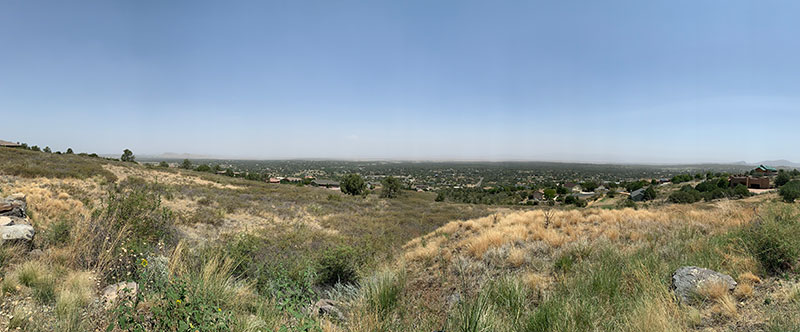Air Quality from Phoenix Dust Storms Impacts Yavapai County
Big Idea
- A pair dust storms affected Phoenix Sunday evening, and winds blew it northwest
- Human health effects of dust relate to the size of dust particles
- Dust particles can lead to coughing, sneezing, asthma and eye irritation
- People with respiratory conditions should stay inside, and avoid prolonged or heavy exertion
- Use your air conditioner - it has a filter!

Dust storm particles blow into Prescott area
A pair of dust storms -- one from the south, the other from the north -- collided over the Phoenix area Sunday evening. The Arizona Department of Environmental Quality confirmed that with the winds moving to the northwest, remnants of these storms reached our area around midnight last night creating the layer of haze over most of Yavapai County this morning. The haze should dissipate throughout the day.
Human health effects of dust relate mainly to the size of dust particles. Dust may contain microscopic solids or liquid droplets that are small enough to get deep into the lungs and cause serious health problems. Large particles may irritate the nose, throat and eyes. The particle size is a major determinant of how serious the health effect will be, especially for lung diseases and the effects on the heart.
Dust particles small enough to be inhaled may lead to:
• irritation of the eyes
• coughing
• sneezing
• hayfever
• asthma attacks
For people with respiratory conditions like asthma, chronic obstructive airways disease (COAD) or emphysema even small increases in dust concentration can make their symptoms worse. Currently it cannot be confirmed that dust exposure causes asthma to develop, however breathing in high concentrations of dust over many years is thought to reduce lung function in the long term and contribute to disorders like chronic bronchitis and heart and lung disorders.
General advice:
- Stay indoors, and close windows and doors where possible
- Avoid exposure to outdoor dust clouds
- Seek medical advice if experiencing increased symptoms
- Avoid prolonged or heavy exertion in areas of high dust pollution
- Air conditioners are safe to use because of their filter systems


















